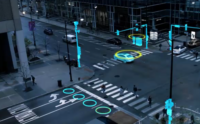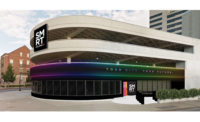Parsons Corp. has launched a Smart Cities Challenge — titled Transforming Intersections — that aims to significantly increase mobility around cities and reduce the amount of time citizens spend at red lights.
Starting Aug. 20, cities and counties in the United States, Canada, and beyond can apply to collaborate with Parsons and partners Amazon Web Services and Verizon to use new mobility technologies based in the cloud and on 5G. The winner of the challenge will receive a free 1-year trial of the Parsons Intelligent Intersections solution for their transportation corridor, says Andrew Liu, Parsons senior vice president for Smart Cities.
Applicants to Transforming Intersections can go to https://www.parsons.com/smart-cities-challenge. Semi-finalists will be announced at the CoMotion LA mobility conference in November and the winner will be announced next spring.
“This is a new solution cloud-based intelligent intersection solution,” says Liu. The winning city will get a free one-year trial deployment.
The idea is to leverage existing data to provide automated traffic re-timing based on changing traffic patterns, enhancing mobility for the region. In addition, connected vehicles can communicate with traffic signals, which will lead to more efficient and environmentally friendly driving with a smaller carbon footprint and, ultimately, safer intersections. Traffic signal owners can also provide priority to transit and emergency vehicles or automatically extend green cycles for pedestrians needing extra time to cross the street.
More than four million hours of annual vehicle delays are caused by poor signal timing alone within the United States, according to Parsons. Forty percent of all pedestrian accidents happen at intersections. And drivers can reduce their fuel consumption by 20 percent with well-timed signals, according to the company.
“We think this will be transformative,” says John Rossant, chairman of the New Cities Foundation and chief curator of CoMotion LA. “Any solution that involves smart intersections means communicating with thousands of vehicles. The question of how that data is treated and processed is key.”




Post a comment to this article
Report Abusive Comment